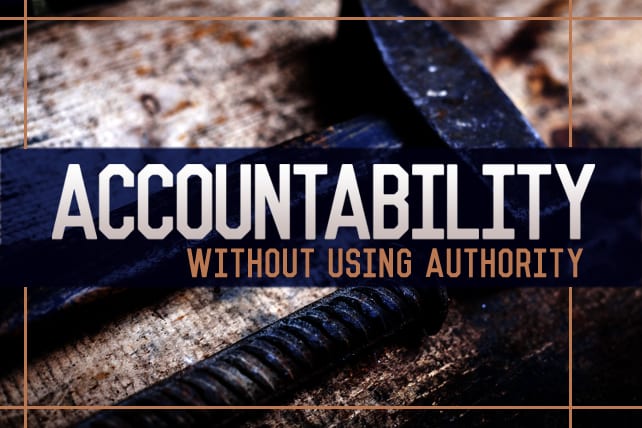How to Hold People Accountable Without Using Authority

“Don’t demand what must be given.”
If you didn’t have authority, how would you hold people accountable?
Don’t demand what must be given.
Short-sighted leaders rely on authority to overcome resistance.
What’s the value of pressuring your team to do what they aren’t committed to do? Accountability isn’t the cure for low commitment, it’s an expression of high commitment.
Commitment can’t be demanded and accountability can’t be coerced. (Over the long-term.)
Forced accountability costs more than it’s worth.
3. Resorting to authority when you encounter resistance.
True accountability is self-imposed. No one can do it for you.
2. Ask resistant team members, “On a scale of 1 to 10 how committed are you to…?” When the number is less than “7,” failure is about commitment, not accountability.
3. Agree upon structures of accountability, don’t impose them. My coaching clients often establish their own accountability. They design a set of questions that I ask them at the beginning of coaching sessions.
4. Describe the big picture and explore the path forward. Accountability requires purpose. Don’t make people accountable.
Create environments where people establish and embrace their own accountability.
Pushing invites resistance. You can’t push people into accountability. They may conform, if you have authority, but their fire goes out.
How might leaders build accountability into organizations?
What makes accountability work?
Don’t demand what must be given.
Authority as a hammer:
Maslow said, “I suppose it is tempting, if the only tool you have is a hammer, to treat everything as if it were a nail.” Accountability is the nail when a leader’s hammer is authority. “You have to hold people accountable!”Short-sighted leaders rely on authority to overcome resistance.
What’s the value of pressuring your team to do what they aren’t committed to do? Accountability isn’t the cure for low commitment, it’s an expression of high commitment.
Commitment can’t be demanded and accountability can’t be coerced. (Over the long-term.)
Forced accountability costs more than it’s worth.
Accountability isn’t:
- Forced compliance.
3. Resorting to authority when you encounter resistance.
True accountability is self-imposed. No one can do it for you.
Establish accountability without pulling rank:
1. Explore commitment when accountability is low. Accountability only works when people share commitments. The uncommitted can be coerced, but they don’t feel accountable.2. Ask resistant team members, “On a scale of 1 to 10 how committed are you to…?” When the number is less than “7,” failure is about commitment, not accountability.
3. Agree upon structures of accountability, don’t impose them. My coaching clients often establish their own accountability. They design a set of questions that I ask them at the beginning of coaching sessions.
4. Describe the big picture and explore the path forward. Accountability requires purpose. Don’t make people accountable.
Create environments where people establish and embrace their own accountability.
Pushing invites resistance. You can’t push people into accountability. They may conform, if you have authority, but their fire goes out.
How might leaders build accountability into organizations?
What makes accountability work?



No comments:
Post a Comment